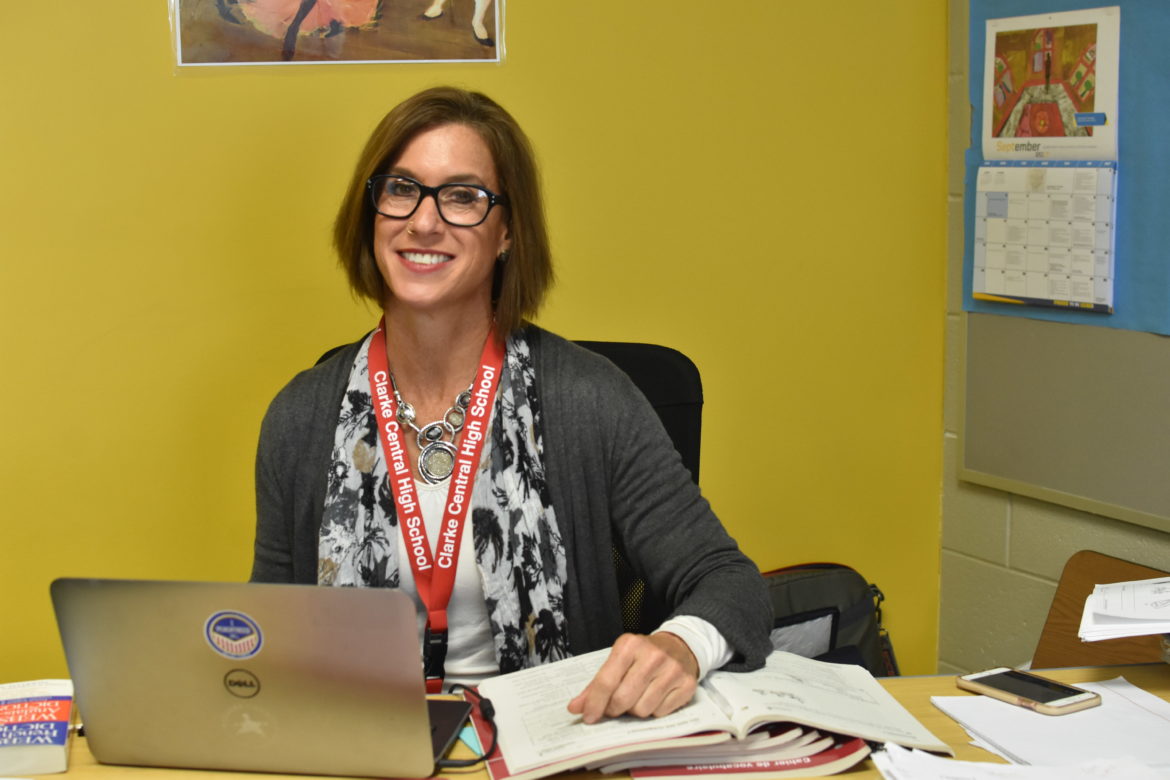Clarke Central High School foreign language department teacher Erica Cascio sits at her desk on Oct. 23 Cascio started teaching at CCHS in August and looks forward to getting to know her students. “I’m really trying to figure out the best ways to connect with the young people and make them interested, and not just in French. I mean, I love the language and the culture, but there’s a bigger story here” Cascio said. Photo by Zoe Peterson.
Clarke Central High School’s new foreign language department teacher, Erica Cascio, speaks on her time at CCHS and how her life experiences have contributed to her variety of positions.
News staffer Luis Garcia: How long have you been teaching?
Foreign language department teacher Erica Cascio: Since August. (I was a substitute) before that though.
LG: How did you come to teach at Clarke Central High School?
EC: It just felt like a great organization, and I was subbing for the French teacher (former foreign language department teacher Kelli Bivins) and then I heard that she was leaving so I knew that her job was gonna be available and as soon as it posted on School Spring, I hurried up and sent all my information and then I interviewed for it and I was lucky enough to get it.
LG: How did you learn French?
EC: I started as a student in the seventh grade in New York. I actually was failing French I until about December, when it finally clicked for me. I just didn’t get it. I didn’t understand because I really didn’t understand how English worked. So I guess in seventh grade is when you’re learning all that stuff about grammar and how your own English works, and then it all just sort of came together for me, somewhere in the middle of that first semester. I continued on with it all through middle and high school, and then when I went to college I switched to Spanish. But it all came out French. Eventually after my first trip to Paris, when I realized that I still had the words I just needed to be in the environment, I went back to school and changed my major and majored in French and English.
LG: How has your time been at Clarke Central?
EC: It’s actually been great. I love the spirit of the students, but all in all, I really like the school. I like the way it’s organized. I like the way the administration works. I’ve been coaching with (Head cross country coach Alex Holmes) in cross country and I really have had a good experience with the athletics department. I’ve been conducting the yoga classes for the Yoga Club and I think that those kids are really great and that they come out before school to stretch out and get prepared. I really have enjoyed my time here, even on the worst days, it’s fun, and I feel like this is worth doing, and I feel like it’s worth doing here.
LG: How did you get into coaching cross country?
EC: So, I have an adult daughter who was a cross country runner, and I was an active cross country parent. That team was at my house all the time. We did all kinds of functions and fundraisers for them. I really enjoyed that experience with her and her coaches. I’m a marathon runner, injured right now, but I feel like it’s getting better, so I should be getting back in the saddle by early next year. I’m a marathon runner and I just love the sport of distance running. And, I understand it. It’s a mental game and I just wanted to be a part of it.
LG: Do you have any major goals or expectations for your first year at CCHS?
EC: I’m really trying to learn how to be a teacher, so that’s why when I say I have a lot of students who are really spirited, I’m really trying to figure out the best ways to connect with the young people and make them interested, and not just in French. I mean, I love the language and the culture, but there’s a bigger story here.
A lot of our students are Spanish speakers as their first language, so (French) is a third language for them, and we have conversations on a regular basis about why that is. Like, what happens in the 15th and 16th and 17th centuries, when Europeans began exploring the seas and going to other lands, and, were the people who they found on these landmasses mute, were they devoid of culture? What happened to those people and their language and their culture, and how does language and culture go together? This is really the conversation I want to be having with these kids and the language is just a framework for that, as far as I’m concerned. It’s a much bigger discussion.
